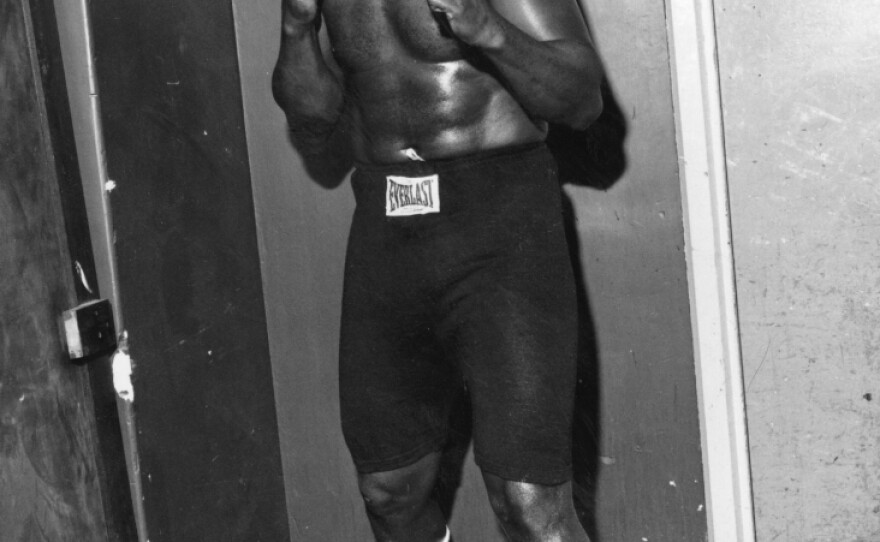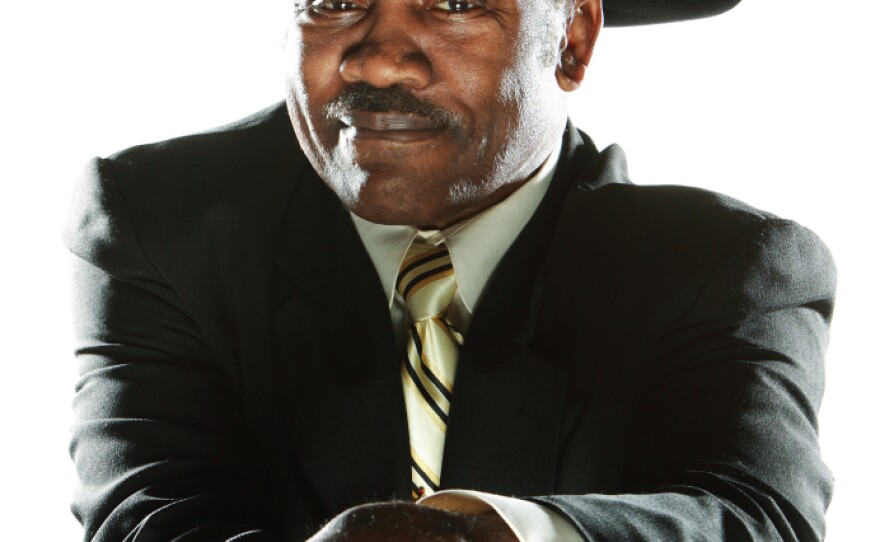Boxing legend Joe Frazier died Monday night at age 67, just weeks after being diagnosed with liver cancer.
The man nicknamed "Smokin' Joe" was one of the greatest heavyweights in history. His three fights with rival Muhammad Ali in the 1970s are part of boxing lore.
And if one were to distill Joe Frazier's lifetime of punches down to one, that sledgehammer left hook on March 8, 1971, was as crushing and symbolic as any.
It put his bitter rival, Muhammad Ali, on his float-like-a-butterfly-sting-like-a-bee keister at Madison Square Garden.
'He Always Liked To Fight'
The punch, which clinched victory over Ali in the so-called "Fight of the Century," started around Joe Frazier's left hip. But its origins stretched back a couple of decades to segregated South Carolina, where a young boy of about 8 from a sharecropping family fashioned a punching bag out of a burlap sack stuffed with rags, corncobs and Spanish moss. By Frazier's own estimation, he slugged that thing for the next six or seven years damn near every day.
"He always liked to fight," said Frazier's old friend Abraham Brown, in the documentary Joe Frazier: When the Smoke Clears. "He had one pair of boxing gloves; I put on one, he put on another. And we just hit one another. So it was in him."
And fighting would take him on a trajectory from South Carolina to Japan, where he won a gold medal at the 1964 Olympics, to the top of the professional heavyweight division by the late 1960s. Along the way, Frazier developed his distinctive style: bending at the waist, ducking under opponent's punches, all the while moving forward — relentlessly forward — looking to throw those punches.

Fearsome punches. Literally.
"I was scared as hell to work with Joe Frazier. And to get hit by Joe Frazier, I was scared," says former heavyweight champion Larry Holmes.
As a young fighter, Holmes worked as Frazier's sparring partner. The fear was justified. Frazier broke Holmes' ribs during one sparring session. That was inside the ring. Outside the ring, Holmes says, it was a different story.
"Joe was Joe, man, and everybody loved him," Holmes says.
Except, it seemed, Muhammad Ali.
Perfect Rivals
The two men couldn't have been more perfect rivals.
Frazier, a squat, bull-like fighter with little formal education; Ali, the supremely skilled and athletic boxer with matching verbal agility and wit. Ali used the latter to inflict psychological cuts on Frazier in the early 1970s when they faced each other in three defining fights that Ali biographer Thomas Hauser calls the "pyramids of boxing."
"What Muhammad did was the first time they fought, he labeled Joe an Uncle Tom. The second time, he branded him ignorant," Hauser says. The third time, he said Frazier was a gorilla.

"You'll see how ugly he is and how pretty I am," Ali said at the time.
And Hauser says Frazier felt betrayed by Ali, because Frazier always admired Ali and respected him for refusing military induction, which resulted in Ali's boxing suspension. He also respected Ali's stance on civil rights issues. But then he felt like he was being taunted, racially, by a fellow black man.
Frazier's feelings sometimes bubbled over in public. Watching Ali, shaking from Parkinson's syndrome, light the cauldron during the 1996 Olympics opening ceremony, Frazier said to a reporter that Ali should have fallen into the flame.
"We was fighting. We was at war. I mean, why should he speak all these terrible things about me and then I didn't say anything about him? So whatever came to my mind and my lips, I spit it out," Frazier later said.
As time went by and Ali's condition got worse, Frazier's wave of bitterness receded, at least publicly. Earlier this year, Frazier said he forgave Ali.
On Monday night, Ali said in a statement: "The world has lost a great champion. I will always remember Joe with respect and admiration."
Copyright 2022 NPR. To see more, visit https://www.npr.org. 9(MDAzMjM2NDYzMDEyMzc1Njk5NjAxNzY3OQ001))







